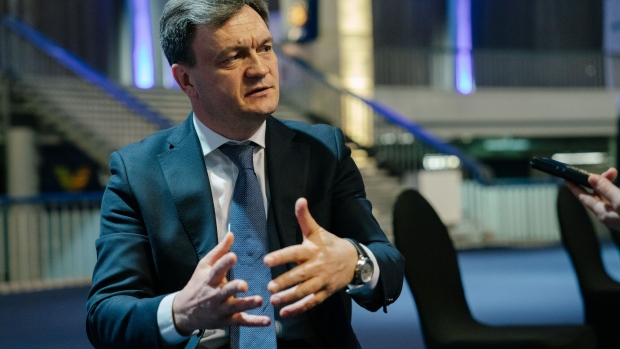Mar 12, 2024
Moldova to Target Kremlin Disinformation as War Holds Off Threat
, Bloomberg News

(Bloomberg) -- Moldova’s premier said authorities will focus on stemming Russian efforts to manipulate public opinion ahead of two crucial ballots this year as the war in Ukraine diminishes any direct threat by the Kremlin against the former Soviet republic.
The nation wedged between Romania and Ukraine has sought to break free of Russia’s influence as its government plots a course to joining the European Union. Moldovans will go to the polls later this year as President Maia Sandu seeks a second term and the country holds a referendum on EU accession.
Prime Minister Dorin Recean cited Kremlin-led plans revealed by Moldovan counterintelligence to erode support for the EU in the nation of 2.6 million by fomenting division, as well as a police crackdown of a scheme to illegally finance political parties to manipulate the vote.
The government in Chisinau needs to exploit a moment when Russian forces, dug in across the front line in Ukraine, pose no direct threat to Moldova, he said.
“There is no way they can reach us militarily in the foreseeable future,” Recean said in an interview in Bucharest. “That’s why we have to consolidate our capacity to handle domestic security and cybersecurity.”
Moldova is bracing for a hybrid attack from Moscow that the nation’s intelligence chief said will involve an “unprecedented level of intensity,” he added.
Recean, who served previous stints as interior minister and Sandu’s security adviser, said Russia is likely to resort to a familiar playbook involving organizing pro-Russian protests by local proxies to sow division — much like demonstrations that turned violent as Moldova embarked on its path to the EU.
“What they tried last year — and what we’ll definitely see again — is corrupting the vote of the people,” Recean said. He called on the EU to extend sanctions to target Moscow-backed groups and individuals who pose a threat to Moldovan elections.
Moldovan police last week stopped a group of more than 200 people accused of seeking to disrupt a meeting of EU conservative leaders in Bucharest in neighboring Romania, according to police chief Viorel Cernauteanu.
The group was trained in the Chisinau and drew illicit Russian funding, including from a group led by oligarch Ilan Shor, the police chief said. Shor, who has sought closer relations with Russia, has repeatedly denied accusations of wrongdoing.
Vulnerable Countries
Romanian Foreign Minister Luminita Odobescu is working with Moldova in tackling the looming cybersecurity and disinformation threat. Six individuals have been sanctioned in relation the activity, but global powers should extend the list by adding Moldovan oligarchs and their organizations as well as companies involved in targeting Recean’s government, she said.
“Unfortunately, Russia is very good at challenging these vulnerable countries,” Odobescu said in an interview in Bucharest. “They know very well the situation in Moldova and they know how to play and use different actors. This issue is very serious and we need to approach it in a coordinated manner.”
Russia is also leveraging influence over Moldova’s breakaway region of Transnistria, as well as the autonomous region Gagauzia, both of which have recently sought to enlist Moscow’s help in staunching Moldova’s bid to wrest control over them by using economic pressure.
Russia has repeatedly denied meddling in foreign elections. The Kremlin’s spokesman Dmitry Peskov said last week that Russia is ready to provide help to the separatist region, “but we prefer settling all issues through political dialog.”
Recean said his government will press ahead with its aim to secure control over Transnistria through peaceful means, by increasing trade links and underscoring the economic benefits.
The premier said Moldova has a contingency plan if Ukraine moves ahead with a threat to halt Russian natural gas flows to Transnistria, which receives free deliveries from Russia. The task could be eased as prices stabilize, he said.
“We have to make sure they have the means and the opportunity to adjust from low energy costs to the market cost,” Recean said. “We’ll have to make them adjust to the new reality, and this is our responsibility, because our people are there.”
--With assistance from Piotr Skolimowski.
©2024 Bloomberg L.P.







